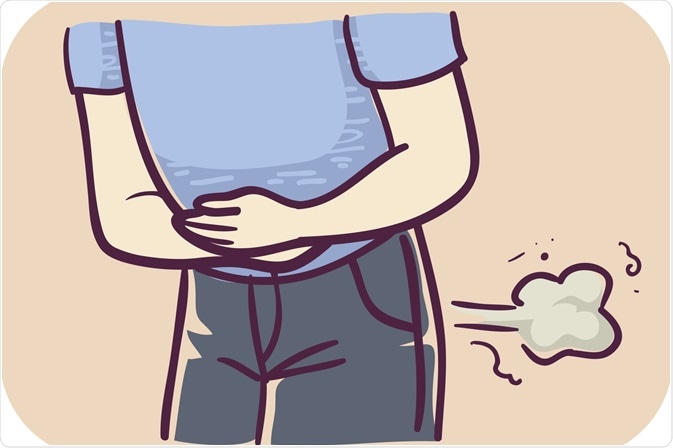Flatulence refers to the passing of gas from the digestive system via the back passage, also known as “passing wind” or “farting.”

Image Credit: Lorelyn Medina / Shutterstock.com
Flatulence is part of a normal biological process and the average person passes gas around fifteen times a day. However, excessive flatulence can become embarrassing and uncomfortable. Diet and lifestyle changes can usually be made to help bring the problem under control.
Causes of flatulence
When food, water, or saliva is swallowed, small amounts of air are also swallowed and collect in the digestive system. Furthermore, gas can build up as food gets broken down by bacteria in the gut.
Accumulated gas can usually be expelled through burping or belching. The passed gas usually only smells when gases such as sulfur are present. In some cases, people may not know they have passed gas because the gas is odorless and only passed in small amounts.
Excessive flatulence can occur after swallowing too much air or eating food that is difficult to digest. Underlying conditions that affect the digestive system can also cause flatulence, such as gastroenteritis.
Swallowing air
Everybody swallows air when they breathe or eat, but it is also easy to swallow a lot of air without realizing it, which can lead to an excess of flatulence. Some of the ways in which excess air is swallowed include:
- Smoking
- Sucking hard sweets
- Wearing loose-fitting dentures
- Chewing gum
- Eating food too quickly and failing to chew properly
- Drinking fizzy drinks that cause carbon dioxide to accumulate in the stomach
Eating certain carbohydrates
Carbohydrates make up a large proportion of our food intake. Some of these carbohydrates are unabsorbable and cannot be digested. Instead, they are passed down into the colon where over 500 types of bacteria are present.
The bacteria in the colon break down the undigested carbohydrate, giving off gases in the process that will eventually be released as flatulence. The main gases produced by these bacterial colonies are carbon dioxide, hydrogen, and methane.
Some examples of these unabsorbable carbohydrates include:
- Pulses
- Beans
- Lentils
- Broccoli
- Cabbage
- Cauliflower
- Artichokes
- Brussel sprouts
- Onions
- Raisins
- Prunes
- Apples
Health conditions
There are also some health conditions that lead to flatulence, some of which include:
- Constipation
- Infection of the bowel or stomach (gastroenteritis)
- Celiac disease (intolerance to gluten)
- Lactose intolerance, characterized by an inability to breakdown and absorb lactose
- Malabsorption, meaning nutrients are not properly absorbed
Treatment
There is no official guideline for determining a normal level of flatulence, but people are generally advised to see their general doctor if the flatulence becomes troublesome. People should also see their general doctor if additional symptoms are present, such as continued abdominal bloating, recurrent episodes of constipation and diarrhea, abdominal pain, unexplained weight loss, blood in the stool, or signs of infection.
If flatulence is becoming a problem, there are several dietary and lifestyle changes that can help, such as avoiding foods that are high in unabsorbable carbohydrates, eating and drinking more slowly, exercising regularly, and eating smaller meals.
Some examples of carbohydrates that are easy to digest include:
- Potatoes
- Lettuce
- Grapes
- Bananas
- Rice
- Yogurt
- Citrus fruits
Exercise can help improve how the digestive system and bowel function, as well as reduce bloating. As smaller meals are easier to digest, eating six small meals a day is less likely to cause flatulence than eating three large meals a day. People can also try to give up smoking because, as well as causing more air to be swallowed, inhaled tobacco smoke can irritate the digestive tract.
Some over-the-counter medications are also available to help relieve flatulence. Charcoal tablets absorb gases produced by the digestive system and some dietary supplements contain alpha-galactosidase, an enzyme that aids carbohydrate digestion. Probiotics can also be helpful, as they encourage the growth of “friendly” bacteria, which aid the breakdown of food in the gut. Examples of these friendly bacteria include lactobacilli and bifidobacteria.
Reference
Further Reading
Last Updated: Feb 16, 2023